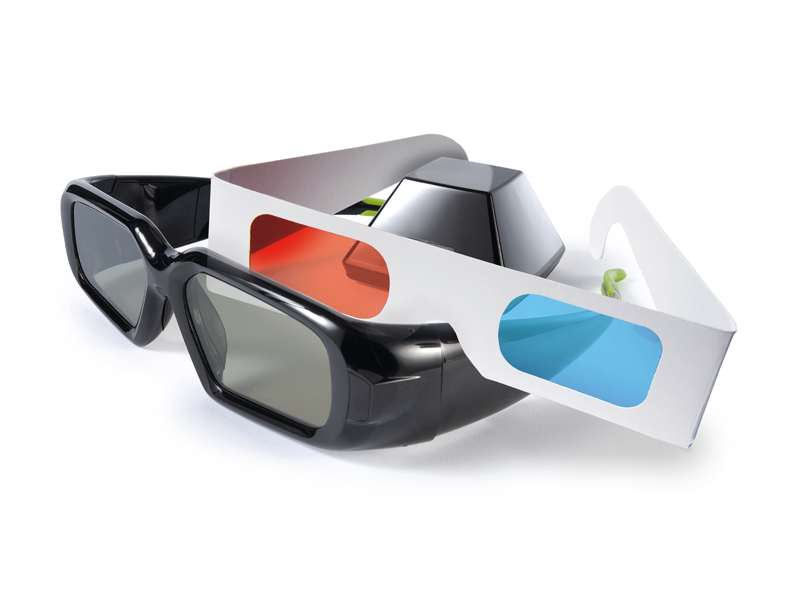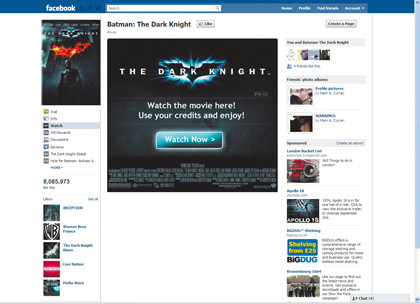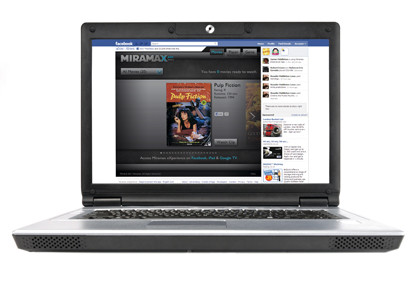
When you can access films direct from your television, laptop, tablet, phone or game console, is there still a place for cinemas?
The arrival of streaming video has not only made it easy for us to access films at times of our choosing wherever we happen to be, it has opened up a massive range of content for us to browse and be entertained by.
You can now enjoy 3D at home, along with surround sound, big screens and a wealth of inexpensive entertainment, all at the touch of a button.
Services like LoveFilm, Netflix, YouTube, Gracenote and iTunes are all making films available in our living rooms, and each person watching a movie at home means one less ticket sold at the cinema.
Cinemas do seem to be suffering: audiences are down (although box office takings are up due to increased prices) and 3D hasn't been the huge draw that theatre owners were hoping for. Who can save them? The film studios? Surely they'd never let cinemas dwindle away - movie theatres must be their lifeblood, after all.
In fact, the studios probably wouldn't be too upset by the loss of the cinema - it's typically the most expensive part of the film distribution process. Most films barely break even at the box office, and studios often see the theatre release of films as a loss leader. The studios recoup their investment with DVD sales and, to a lesser extent, on-demand rentals.
It would go against business sense to include cinemas in the film distribution process at all were it not for the massive amount of hype produced by a high profile film premiere. It's hard to do that with the release of a DVD.
Get daily insight, inspiration and deals in your inbox
Sign up for breaking news, reviews, opinion, top tech deals, and more.

Social media is stepping into that gap as red carpets give way to social interactivity. Create a good buzz online, and DVD and on-demand sales will be assured. If a film company can get enough people to 'Like' their film on Facebook, tweet the trailer, play the accompanying iPhone app or watch the teaser campaigns on their iPads, profits will rise.
But there's a problem: in this world of instant entertainment when and where you want it, the fact that you have to wait for a film to finish its cinema run before you can get it in your home seems increasingly outdated. It will therefore come as no surprise that moves are afoot to reduce the delay between cinema premieres and DVD or on-demand releases.
Ten years ago, you had to wait half a year after a film was released to get your hands on it at home - a gap that has since narrowed to around four months. Studios are trying to speed up DVD releases even further, but they face stiff opposition - and not just from cinemas.
The studios' argument is simple: most films have finished their cinema run after two months, so there is then a two-month wait during which pirate copies are the only way consumers can see the latest blockbusters. The studios say that cutting down the time it takes for films to be released on DVD or streaming services won't harm cinemas and will reduce piracy, but this strategy has met strong resistance.
Video nasties
In 2010, the cinema companies Odeon, Vue and Cineworld threatened to boycott Tim Burton's film Alice in Wonderland when Disney announced plans to release the DVD just three months after the first screening. It was only the day before the royal premiere in London, with Prince Charles in attendance, that Odeon lifted the boycott, having negotiated guarantees with Disney to protect the theatrical window.
In May this year, Warner Bros, Sony, Fox and Universal all agreed to supply their films to a home premiere service from American satellite company DirecTV. Subscribers would page $30 a month for access to new films a mere eight weeks after their theatrical release, in full HD. Again this was met with an outcry - not just from theatres, but also some of Hollywood's biggest names.
A host of world-famous directors including Peter Jackson, James Cameron, Kathryn Bigelow, Michael Bay and Guillermo del Toro signed a letter to the studios titled 'An open letter from the creative community on protecting the movie-going experience'.
Here are few extracts: "Lately, there's been a lot of talk by leaders at some major studios and cable companies about early-to-the-home 'premium video-on-demand'. In this proposed distribution model, new movies can be shown in homes while these same films are still in their theatrical run.
"As a crucial part of a business that last year grossed close to $32 billion in worldwide theatrical ticket sales, we in the creative community feel that now is the time for studios and cable companies to acknowledge that a release pattern for premium video-on-demand that invades the current theatrical window could irrevocably harm the financial model of our film industry.
"As leaders in the creative community, we ask for a seat at the table. We want to hear the studios' plans for how this new distribution model will affect the future of the industry we love. And until that happens, we ask that our studio partners do not rashly undermine the current - and successful - system of releasing films in a sequential distribution window that encourages movie lovers to see films in the optimum, and most profitable, exhibition arena: the movie theatres of America."
Friends with benefits
The cinema industry has some friends in high places, but the service still went ahead. Although this type of protest may slow down the studios a little, it's unlikely to reverse the trend, particularly as so many more avenues are opening up for distribution of films.
For the studios, it makes the most financial sense to strike while the buzz about a movie is still in the air. As mentioned earlier, studios are already eyeing up social media as a useful new revenue stream, and are experimenting with ways to monetise it.
In the US, anyone who 'Liked' Christopher Nolan's 2008 film The Dark Knight was given the chance to watch the film for 30 Facebook credits (or $3). This was an astute move - The Dark Knight's movie page has four million fans, giving studios a targeted audience for marketing.
"Facebook has become a daily destination for hundreds of millions of people," Warner Bros said in a statement. "Making our films available through Facebook is a natural extension of our digital distribution efforts. It gives consumers a convenient way to access and enjoy our films through the world's largest social network."
For their 30 credits, Facebook users got the film for a 48-hour rental period (iTunes, Amazon and Vudu only provide movies for 24 hours), and could click to watch it in their browser. Warner Bros was keen to point out this was just a test and not all feedback was positive, with reports of a missing HD option and poor streaming even on good broadband connections. It won't be long before this is a viable option though, and you only have to look at BBC iPlayer's 153 million programme requests in July 2011 to see that people are happy to put up with the quality of streamed video.
Miramax has followed suit with Miramax eXperience, its movie rental app for Facebook, which offers 10 films to rent, each costing 30 Facebook credits in the UK and Turkey. The company was open about the fact that its audience is already on Facebook, pointing out that it could build a platform on its own website, but people might not hear about it.
The service also has an aspect of social gaming, where users can cast their friends as characters in films. This is designed to help spread the word about the service.
Other companies have already made significant inroads in the online film distribution market. We spoke to Simon Morris, LoveFilm's Chief Marketing Officer, who was keen to point out that LoveFilm does not see itself as a competitor to cinemas.
"Film lovers all around the world visit the cinema for the unique experience it offers," he said. "LoveFilm's pioneering UK film delivery service was not created to compete with the cinema, but provide customers with additional choice and convenience. Different customers consume films in different ways and the fact that everyone has the choice to visit the cinema, get a DVD or stream a movie instantly on a number of platforms offers a number of choices that are beneficial to the customer."
When we asked Morris whether LoveFilm had any plans to decrease the time between films being released in cinemas and appearing for download on the service, he said he was unable to comment.
Saving grace
Smart TV technology company Gracenote is another business hoping to offer viewers something they can't get from cinemas. We spoke to Stephen White, the company's president, to find out more about the features he hopes to offer.
"Gracenote is developing technologies that further build on its roots in media recognition to create true interactive TV experiences for home cinema viewers," he explained.
"One example of this is our work in the area of Advanced Content Recognition (ACR), which allows a tablet or mobile phone to recognise scenes and transitions within a TV program or movie. For example, if a viewer is watching an episode of Law and Order on their HDTV, Gracenote's ACR technology would use the tablet's built-in microphone to identify the specific scene in the program. From there, all of the actors, music and advertising brands can be identified in that scene in real time and presented on the tablet.
"The potential for this type of technology is massive. Scene level recognition allows viewers to use their tablet or mobile phone to identify the clothing worn by the characters, the beverages they are drinking, the music playing in the opening credits and much more. Viewers can then link to an advertiser's website, buy the clothing, download the song and order the drink."
He too was keen to stress that the cinema experience is completely different to that of the home theatre and that he didn't feel the two overlapped: "Movie theatres give you the big-screen experience with an auditorium full of loudspeakers playing at reference level surround sound.
"Plus, going to the movie theatre offers a night out with your friends or loved ones, and you get to share the experience with a larger audience in a social setting. However, your home cinema experience is more personal. It allows you to lean back and enjoy new movies or old favourites from on-demand services and cable channels. You can hit the pause button, text friends and eat dinner, while still enjoying great sound and pictures."
Death of the multiplex

Despite these protestations to the contrary, if the situation were to change and you could get films on your television or PC on the day of their release, would you still make the effort to visit your local cinema to see them? Could interactive high quality video streaming spell the end for the multiplex?
Reports that traditional cinemas have had their day are nothing new; cinemas have already seen off the rise of television, VHS, DVDs and even Blu-ray, so will the threat posed by video on demand be any different?
We spoke to cinema chains Vue and Cineworld to ask what attraction cinemas could offer compared to watching films at home.
"A trip to the cinema is not just about watching a film; it is about the complete entertainment experience," Cineworld told us. "For example, the use of Real D technology that's used in all of Cineworld Cinemas' 3D screens has perfected a digital approach to 3D, allowing customers to now experience remarkable depth and clarity, pulling them into a film for a truly immersive experience.
Following Cineworld Cinemas' acquisition of the O2 cinema multiplex in June 2010, Cineworld is now able to offer customers the largest 3D screen in Europe, standing at 24.4m."
Mark de Quervain, Sales and Marketing Director at Vue Entertainment, agreed: "Watching the latest films at the cinema has always been a unique experience. People enjoy the combination of being the first to see the latest movie on the big screen and having the surround sound effect.
Vue offers a number of unique services to give our cinemagoers the choice to see the latest blockbuster in a variety of ways. Some of these include Vue Xtreme Screens, which are supersized 3D screens, VIP seating, Scene Screens, which include reclining seats and a private lounge and bar area, as well as still offering people the chance to see films on regular 2D cinema screens.
While more people are investing in wide screen plasma TVs at home and a surround sound atmosphere, going out to the cinema is more of an experience now than ever before and is regarded as a fun night out with friends and family, which is difficult to replicate at home."
So, are the big cinema chains concerned about the rise of video on demand services?
"Although there has been a rise in the ease of internet-delivered movies," said de Quervain, "the quality of these movies will never equal that of the cinema experience and, for serious moviegoers, will not replace the cinema as the ultimate entertainment vehicle."
Cineworld's spokesperson added: "Unlike internet-delivered movies, a trip to the cinema is about an immersive cinema experience rather than merely just watching a film. It is an opportunity to take time out from everyday life and treat yourself, whether on your own or with friends and family."
- 1
- 2
Current page: Video on demand vs Cinema: Online buzz
Next Page Video on demand vs Cinema: 3D boost